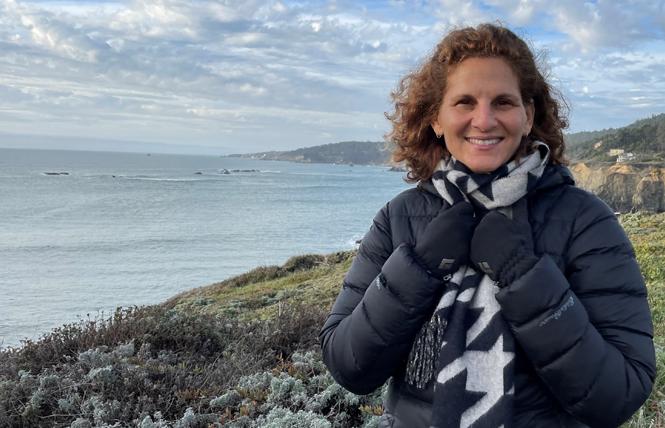What queer identity and addiction have in common is that one can choose to be closeted about both. That was my lived experience until I was 40. Today, I advocate for openness around sexuality, but transparency around addiction and recovery are equally as important. For me, fear and denial prevented me from living an authentic, healthy, and fulfilled life for decades. Now, as an openly queer and sober woman, I am experiencing inner peace, growth, happiness, and healing — all outcomes of my journey to self-acceptance and recovery. I’ve come to learn that stigma and shame are toxic barriers that must be eradicated so more people can find freedom from isolation and fear.
Growing up in the 1980s in the San Francisco Bay Area, I started experimenting with drugs and alcohol as a teenager. Following the unexpected death of my brother and my parents’ subsequent divorce, I found that substance use numbed my pain and grief. By the age of 16, I would commonly drink to the point of blacking out. In high school, I dated boys and had secret hook-ups with girls. From outside perspectives, I was achieving what was expected of me — I “fit in” to the social norms of a high school student — I was editor of the yearbook, played varsity sports, and excelled academically. But internally, I felt extremely disconnected. I was hiding my sexuality and had become dependent on alcohol. I had no role models in my community who were bisexual or in recovery from a substance use disorder.
In college, I continued to drink and use drugs while progressing with my studies. My peers seemed to do the same. I dated men openly and slept with women when drunk. I used alcohol as a way to explore my sexuality without having to own an orientation. At that time, alcohol calmed my inner conflict and was easy to blame for any “inappropriate” behavior.
By my senior year at Sarah Lawrence College, I had fallen into a deep depression. I was uncomfortable with my sexuality, my extreme substance use, and feared the future. I was lonely even when surrounded by friends and I had suicidal ideations. By then I was habitually drinking and using street drugs. Nevertheless, the outside indicators of being stereotypically “on track” allowed me to keep moving forward and ignore the signs that I needed help.
In my 20s, I married a man; lived overseas; had a child. In my 30s, I earned a graduate degree; moved back to the Bay Area; had another child; brought in a six-figure income; purchased a home; and volunteered in my community. I was blessed, privileged, and successful by all outside measures — yet I was in emotional turmoil. I drank to quiet my inner knowing that something was gravely wrong. None of my family members or friends knew that I had a drinking problem.
Just before turning 40, I felt a soul sickness even though I continued to keep up with my responsibilities. After brutal arguments with my husband and many sleepless nights, I finally entered therapy, filed for a divorce, and openly started dating women. I began to deal with my childhood trauma and confront my shame. Yet, I did not quit drinking. How could I let go of the “one thing” that gave me relief? I did not understand the toxicity and harm alcohol was causing.
I managed to control my consumption for a few months. Yet, without new coping strategies or life skills, the inner chaos escalated. There came a defining day so psychologically painful that I admitted to myself that I needed help to stop drinking. Little did I know that my sobriety journey was just the beginning of healing and the incredible life changes to come.
During my 40s and into my 50s, I led a San Francisco-based social-impact nonprofit, focused on ending addiction stigma and championing recovery before starting my own firm. I healed my relationship with my ex-husband, grew in so many ways and then met my beloved — she and I are now planning our marriage. Professionally, I now help people integrate recovery into all areas of life and offer companies recovery wellness strategies to enhance employee engagement, well-being and cultural safety. Today, I live a life of congruence, health, and integrity. In recovery, my inside and my outside match.
There are over 22 million people in the U.S. living successfully in long-term recovery, however, the majority of us stay silent and invisible to avoid backlash. I share my story and am open so those needing support can recognize themselves in me and know that a happier, healthier, and more authentic life is possible. Some people think being open about recovery is in direct conflict with Alcoholics Anonymous’ tradition of anonymity, but I believe being open about recovery is an act of pride, advocacy, education, and hope.
With only one in 10 people able to find help out of the 20 million in the U.S. struggling with a substance use disorder — I strongly believe that the time is now to stand up and be open! We must replace shame with empowerment. Let us utilize the power of our voices to end the stigma of addiction. I am open. Are you?
If you or a loved one want to re-assess your relationship with alcohol or learn more about recovery options, check out these resources about alcohol; a quiz; information about treatment; and other resources.
Fay Zenoff is an addiction recovery wellness strategist, consultant, and coach working with individuals, families, treatment centers, and businesses to support freedom from addiction and the integration of recovery into all areas of wellness. Learn more at www.fayzenoff.com
Help keep the Bay Area Reporter going in these tough times. To support local, independent, LGBTQ journalism, consider becoming a BAR member.

